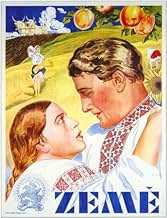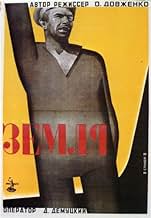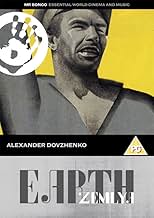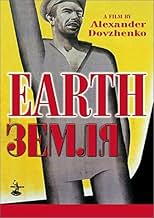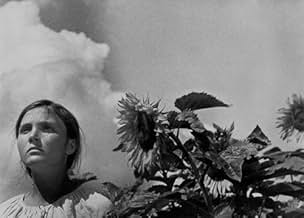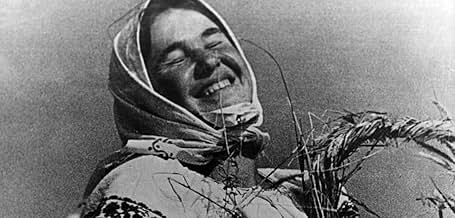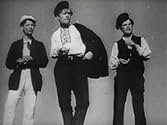NOTE IMDb
7,2/10
6,8 k
MA NOTE
Dans la campagne paisible, Vassily s'oppose aux riches kulaks contre l'arrivée de l'agriculture collective.Dans la campagne paisible, Vassily s'oppose aux riches kulaks contre l'arrivée de l'agriculture collective.Dans la campagne paisible, Vassily s'oppose aux riches kulaks contre l'arrivée de l'agriculture collective.
- Réalisation
- Scénario
- Casting principal
- Récompenses
- 1 victoire et 1 nomination au total
Stepan Shkurat
- Opanas
- (as S. Shkurat)
Semyon Svashenko
- Vasyl - son of Opanas
- (as S. Svashenko)
Yuliya Solntseva
- Daughter of Opanas
- (as Yu. Solntseva)
Yelena Maksimova
- Natalya - Vasyl's fiancee
- (as Ye. Maksimova)
Nikolai Nademsky
- Ded Semyon
- (as N. Nademsky)
Ivan Franko
- Kulak Belokon
- (as I. Franko)
Pyotr Masokha
- Khoma - son of kulak Belokon
- (as P. Masokha)
Vladimir Mikhaylov
- Priest
- (as V. Mikhaylov)
Pavel Petrik
- Young Party-Cell Leader
- (as P. Petrik)
P. Umanets
- Chairman of the Village Soviet
- (as Umanets)
Luka Lyashenko
- Young Kulak
- (as L. Lyashenko)
Vasiliy Krasenko
- Old Peter
- (non crédité)
M. Matsyutsia
- Farm Girl
- (non crédité)
Avis à la une
10Rigor
This great masterpiece of Soviet cinema has images so powerful and an editing technique so bold that at times the narrative is transcended. By this I mean that the film goes beyond it's original intention of arguing for changes from individualistic to more technologized and collective agricultural strategies and becomes a kind of realization of what a "liberated" agricultural zone would really look and feel like. This is a film ripe with the excitement of the creation of a new art to match a hopeful new world. It hardly needs to be mentioned that Stalinsit forces decried the final results of this masterpiece; calling it decadent and stylistically elitist. In actuality the film is too Marxist (I would go so far as to say too Leninist) for Stalinism. The film respects the ability of the viewer (and the viewers were assumed to be proletariat working class and agricultural workers) to grapple with rigorous ideas and images and to function outside of the narrative frame of individualistic melodrama. Like many early Soviet films this work seems not only ahead of its time, but, actually ahead of ours.
Stalin may have wanted an ode to collective agriculture; what he got instead was a hymnal to mother nature and the toiling offspring who dwell in her bosom. Those opening shots of pulsating fields waving in the wind have no equal for sheer evocative power. Earth is revealed at once as a living, breathing being and bountiful provider. Flower, fruit, decay, renewal -- nature's timeless cycle. The soundless imagery is at times so wonderfully lyrical that contemporary viewers may be led to recognize how much has been lost to the technology-driven cinema of today. Even the occasional plot crudities are rescued by a style that is both brilliant and unerringly pictorial. Close-ups of weather-worn peasants, a lone kulak and oxen beneath an immense sky, great rolling plains and far horizons of the Ukrainian breadbasket -- this is the sheer lyrical sweep of the Dovchenko masterpiece, a montage that transcends all obstacles, real and man-made. Not even the estimable John Ford frames primitive elements as grandly as this. There are flaws. Too many rushing crowd scenes appear without purpose, except to mimic Eisenstein's "march of history", while the propaganda thread at times blends uneasily with the lyrical. Still and all, Dovchenko pulls off the theme of new beginning more seamlessly than might be expected. Far from being a mere relic of the silent era, or an ode to Stalinist collectivism, Earth remains an enduring testament to the power of cinema as sheer visual poetry.
Like 'The Birth of a Nation' or 'The Triumph of the Will', 'Earth' is a brilliant, groundbreaking film even if morally despicable. And in retrospect of what happened after its release, Stalin's liquidation of millions of Kulaks, its hard not to compare Dovzhenko's Marxism to Reifenstahl's fascism or Griffith's racism. Apologists for all of these filmmakers tell us to 'ignore the story' or 'ignore the propaganda'. Even the Kino DVD introduction instructs us to not take the film literally.
Perhaps instead of asking, 'Can propaganda be art?' the better question is , 'Can art transcend propaganda.' In 'Earth', I think Dovzhenko partially succeeds. The lyrical cycles of birth and death on the Ukrainian steppe are told with visual poetry. In fact, as the film goes on Dovzhenko obviously becomes uninterested in the circumstances of Vasily's murder and martyrdom for the collectivist cause. No doubt, the Soviet regime produced this film to (a) encourage collectivization against private ownership, and (b) Encourage a retro-pagan worship of agrarian life against orthodox Christianity. The collectivist vs. Kulak story in (a) is crude and unconvincing propaganda to a modern audience with historical perspective on Stalin's brutalities in the 1930's. However, it is with the fertile imagery and montage of natural cycles in (b) that Dovzhenko succeeds beautifully and transcends the story and makes it timeless.
Perhaps instead of asking, 'Can propaganda be art?' the better question is , 'Can art transcend propaganda.' In 'Earth', I think Dovzhenko partially succeeds. The lyrical cycles of birth and death on the Ukrainian steppe are told with visual poetry. In fact, as the film goes on Dovzhenko obviously becomes uninterested in the circumstances of Vasily's murder and martyrdom for the collectivist cause. No doubt, the Soviet regime produced this film to (a) encourage collectivization against private ownership, and (b) Encourage a retro-pagan worship of agrarian life against orthodox Christianity. The collectivist vs. Kulak story in (a) is crude and unconvincing propaganda to a modern audience with historical perspective on Stalin's brutalities in the 1930's. However, it is with the fertile imagery and montage of natural cycles in (b) that Dovzhenko succeeds beautifully and transcends the story and makes it timeless.
In Ukraine the landowners hold out against progress and the rights of communally worked farms of the people. When one such farm gets a tractor to further help them one of the richer farmers murders one of the collective, hoping to stop the movement in its tracks. However the opposite is true and the collective rises up out of the oppression and the tragedy to overcome the selfish and cruel approach of the rich.
This is one of those films that I knew I had to see rather than one of those films that are less well regarded but are less demanding to watch. I am glad that I finally got round to it because it is technically and visually a very good film with some very striking images. This is different from it being a good film due to the narrative though because in this regard it is quite a mixed bag. The structure of the tale is not great and it doesn't flow together in a way that I found engaging but more of concern to the modern viewer is the sweeping unquestioning propaganda that the story essentially is. It would be nice to pretend that this does not detract from the film but it does and not because I happen to disagree with the point being made but just because it is the simplistic clumsy point making of propaganda and it does jar slightly.
Dovzhenko's visuals are where the film is strongest though and it is worth seeing for this because whether is the depiction of sorrow or the beauty of the open fields, he catches it really well. If only he had done more with the performances then things would have been helped, not to mention the clunky dialogue cards (although I have to assume that those are mostly down to poor translation). So as long as you are not expecting this to be a fun experience or a great story then it is indeed a classic film that you should watch as part of an education in cinema.
This is one of those films that I knew I had to see rather than one of those films that are less well regarded but are less demanding to watch. I am glad that I finally got round to it because it is technically and visually a very good film with some very striking images. This is different from it being a good film due to the narrative though because in this regard it is quite a mixed bag. The structure of the tale is not great and it doesn't flow together in a way that I found engaging but more of concern to the modern viewer is the sweeping unquestioning propaganda that the story essentially is. It would be nice to pretend that this does not detract from the film but it does and not because I happen to disagree with the point being made but just because it is the simplistic clumsy point making of propaganda and it does jar slightly.
Dovzhenko's visuals are where the film is strongest though and it is worth seeing for this because whether is the depiction of sorrow or the beauty of the open fields, he catches it really well. If only he had done more with the performances then things would have been helped, not to mention the clunky dialogue cards (although I have to assume that those are mostly down to poor translation). So as long as you are not expecting this to be a fun experience or a great story then it is indeed a classic film that you should watch as part of an education in cinema.
What an unusual and memorable film this is, almost more like a poem or an impressionist painting than a movie. It's filled with activity and images that push the actual story into the background. Sometimes the characters overreact to events in a highly exaggerated fashion, while at other times they barely respond to what happens - yet it seems both real and believable. The movie is probably not quite as great as some would have it, but it has an unusual appeal that makes you want to watch it (or, perhaps, experience it) over again.
The scenes often have little connection with one another, and it's clear that the plot is not meant to be the main emphasis. On the surface, the story is about the collective farm, their hopes of getting new machinery, and their rivalry with the independent landowners. But it's intended to be something more subtle and worthwhile than a political message. The themes and images involving the characters and, especially, the "Earth" itself, are more vivid than the slight story-line.
To be sure, the collectivist perspective from which the film was made is rather obvious. But that does not detract from this unusual achievement. And while it would not work as light or casual entertainment, it is well worth watching, and it's a movie you won't forget afterwards.
The scenes often have little connection with one another, and it's clear that the plot is not meant to be the main emphasis. On the surface, the story is about the collective farm, their hopes of getting new machinery, and their rivalry with the independent landowners. But it's intended to be something more subtle and worthwhile than a political message. The themes and images involving the characters and, especially, the "Earth" itself, are more vivid than the slight story-line.
To be sure, the collectivist perspective from which the film was made is rather obvious. But that does not detract from this unusual achievement. And while it would not work as light or casual entertainment, it is well worth watching, and it's a movie you won't forget afterwards.
Le saviez-vous
- AnecdotesSoviet censors made Aleksandr Dovzhenko eliminate a number of scenes from the film, including the scene of peasants urinating into a tractor radiator, and the scene of nude woman mourning over her dead fiance. The original uncut version was screened in Ukrainian republic when first released, and then in the Museum of Modern Art (New York City, USA) about 40 years later, on 10 October 1969.
- Versions alternativesIn 1997, the film was re-released in Germany by ZDF, with a new score composed by Alexander Popov. This version was digitally improved (known as Arte Edition), then released on DVD and distributed by the absolut MEDIEN GmbH in 2006. The running time is 78 minutes. The crew participants:
- Alexander Popov, Composer;
- Frank Strobel, Conductor;
- Evgeniy Nikulskiy, Sound engineer;
- Nina Goslar, Commissioning editor.
- ConnexionsEdited into Le tombeau d'Alexandre (1993)
Meilleurs choix
Connectez-vous pour évaluer et suivre la liste de favoris afin de recevoir des recommandations personnalisées
- How long is Earth?Alimenté par Alexa
Détails
- Durée1 heure 15 minutes
- Mixage
- Rapport de forme
- 1.33 : 1
Contribuer à cette page
Suggérer une modification ou ajouter du contenu manquant



